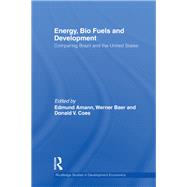
Note: Supplemental materials are not guaranteed with Rental or Used book purchases.
Purchase Benefits
What is included with this book?
| List of figures | p. xv |
| List of tables | p. xvii |
| List of contributors | p. xxi |
| Introduction | p. 1 |
| Macroeconomic and distributional dimensions of energy shocks | p. 3 |
| Oil price shocks and the macro economy: the United States versus Brazil | p. 5 |
| Energy and income distribution in Brazil's development process | p. 23 |
| The earth is finite and other irrelevancies about the world's ultimate oil supply | p. 38 |
| Energy restrictions to growth: the past, present and future of energy supply in Brazil | p. 51 |
| Oil prices and inflation in Brazil: exchange rate versus inflation targeting | p. 65 |
| Brazilian energy independence: petroleum, trade and economic efficiency | p. 72 |
| The role played by the BNDES in funding electricity investments in Brazil | p. 95 |
| Social, local and environmental impacts of changes in the energy market | p. 111 |
| Climate change, energy use and long-run growth in Brazil | p. 113 |
| Spatial interactions between energy and energy-intensive sectors in the Brazilian economy: a field of influence approach | p. 122 |
| Determinants of the income of workers in sugar cane plantations and in the sugar and ethanol industries in the North-Northeast and Center-South regions of Brazil | p. 137 |
| A framework for examining the impact of bio fuels on the poor in Brazil | p. 151 |
| Bio fuels, food, and trade: a comparison of bio fuel development efforts in two communities in Illinois | p. 164 |
| Oligopolistic behavior of Brazilian gas stations | p. 178 |
| The impacts of bio and alternative fuels | p. 195 |
| The journey to the next-generation of bioeconomy: the US perspective | p. 197 |
| Between sustain ability and development: bioenergy, land use, food security and lifecycle analysis | p. 203 |
| Bio energy efficiency and a flex-mill simulation in Mato Grosso | p. 221 |
| The impacts of agriculture-based energy sources on land use in Brazil | p. 236 |
| Fossil fuels, bio fuels, and food: ranking priorities | p. 256 |
| The expansion of ethanol and land use in Brazil's Cerrado | p. 268 |
| The viability of the biodiesel program as an instrument of social inclusion | p. 285 |
| The expansion of sugarcane cultivation and its impact on municipal revenues: an application of dynamic spatial panels to municipalities in the state of Sao Paulo, Brazil | p. 292 |
| Conclusions | p. 315 |
| Conclusions | p. 317 |
| Index | p. 322 |
| Table of Contents provided by Ingram. All Rights Reserved. |
The New copy of this book will include any supplemental materials advertised. Please check the title of the book to determine if it should include any access cards, study guides, lab manuals, CDs, etc.
The Used, Rental and eBook copies of this book are not guaranteed to include any supplemental materials. Typically, only the book itself is included. This is true even if the title states it includes any access cards, study guides, lab manuals, CDs, etc.